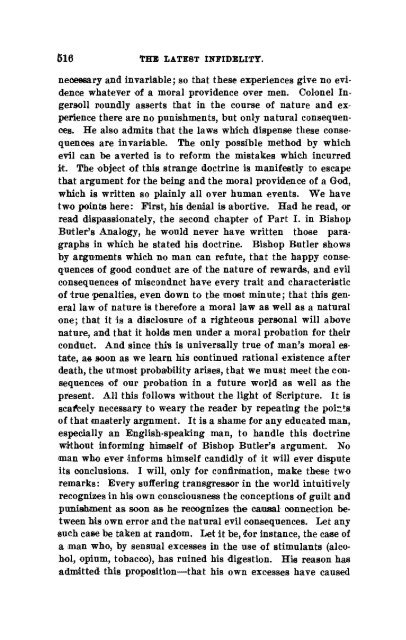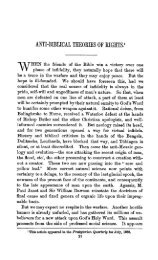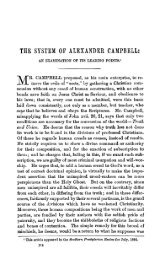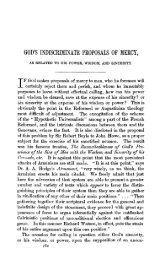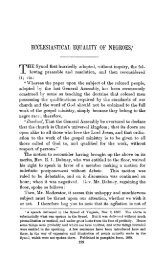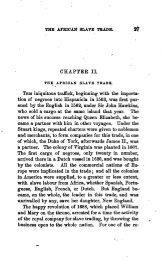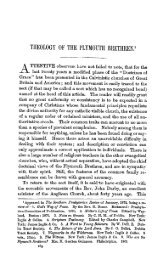The Latest Infidelity.pdf 487KB May 19 2009 - R.L. Dabney Archive
The Latest Infidelity.pdf 487KB May 19 2009 - R.L. Dabney Archive
The Latest Infidelity.pdf 487KB May 19 2009 - R.L. Dabney Archive
Create successful ePaper yourself
Turn your PDF publications into a flip-book with our unique Google optimized e-Paper software.
616 THE LATEST INFIDELITY.<br />
necessary and invariable; so that these experiences give no evi-<br />
dence whatever of a moral providence over men. Colonel In-<br />
gersoll roundly asserts that in the course of nature and ex-<br />
perience there are no punishments, but only natural consequen-<br />
ces. He also admits that the laws which dispense these conse-<br />
quences are invariable. <strong>The</strong> only possible method by which<br />
evil can be averted is to reform the mistakes which incurred<br />
it. <strong>The</strong> object of this strange doctrine is manifestly to escape<br />
that argument for the being and the moral providence of a God,<br />
which is written so plainly all over human events. We have<br />
two points here: First, his denial is abortive. Had he read, or<br />
read dispassionately, the second chapter of Part I. in Bishop<br />
Butler's Analogy, he would never have written those para-<br />
graphs in which he stated his doctrine. Bishop Butler shows<br />
by arguments which no man can refute, that the happy conse-<br />
quences of good conduct are of the nature of rewards, and evil<br />
consequences of miscDnduct have every trait and characteristic<br />
of true 'penalties, even down to the most minute; that this gen-<br />
eral law of nature is therefore a moral law as well as a natural<br />
one; that it is a disclosure of a righteous personal will above<br />
nature, and that it holds men under a moral probation for their<br />
conduct. And since thiis is universally true of man's moral es-<br />
tate, as soon as we learn his continued rational existence after<br />
death, the utmost probability arises, that we must meet the con-<br />
sequences of our probation in a future world as well as the<br />
present. All this follows without the light of Scripture. It is<br />
scarcely necessary to weary the reader by repeating the points<br />
of that masterly argument. It is a shame for any educated man,<br />
especially an English-speaking man, to handle this doctrine<br />
without informing himself of Bishop Butler's argument. No<br />
man who ever informs himself candidly of it will ever dispute<br />
its conclusions. I will, only for confirmation, make these two<br />
remarks: Every suffering transgressor in the world intuitively<br />
recognizes in his own consciousness the conceptions of guilt and<br />
punishment as soon as he recognizes the causal connection be-<br />
tween his own error and the natural evil consequences. Let any<br />
such case be taken at random. Let it be, for instance, the case of<br />
a man who, by sensual excesses in the use of stimulants (alco-<br />
hol, opium, tobacco), has ruined his digestion. His reason has<br />
admitted this proposition—that his own excesses have caused


